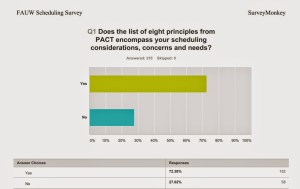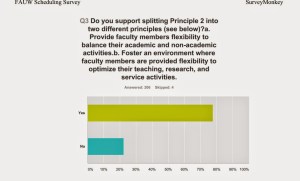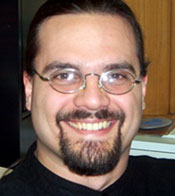By Bryan Tolson, FAUW Vice President
By now, you should have heard about – and hopefully read – the memo regarding the Fall 2016 changes to the scheduling system. With these substantial changes now officially announced, it seems an appropriate time for another blog post about scheduling.
The point of this post is to give you my thoughts, as FAUW’s representative on PACT (the Provost’s Advisory Committee on Timetabling), on the scheduling system and in particular the most recent memo from PACT addressing the system of constraints. I will close with some essential facts and recommendations about how you can get what you need under the revised system.
If you have not read the memo (PDF), I suggest you do so before continuing below. FAUW has posted scheduling system-related blog posts in the past few years. For a refresher on the ongoing debate around scheduling, read:
It is both my and the Board’s basic premise that the new scheduling system is here to stay and that our goal is to work with it and the Administration to get the best for FAUW members. That said, we must also realize that it is a centralized scheduling system in which every unit and every faculty member must share finite space and, thus, lecture times. Equity and fairness are a big concern for all on PACT (including me), as well as for FAUW. Any accommodation made for one faculty member will impact another so these cannot be made lightly.
Let me provide a concrete example. If you attempt to “game” the system so that you avoid teaching Friday afternoons, you are effectively sentencing a colleague to teach in that time slot. (So please keep your colleagues in mind as you attempt to define a teaching schedule that works for you.) Negotiating this balancing act is not a simple exercise and this newest memo is another attempt to strike that balance.
What I like in the memo
There is much to like about this latest iteration of PACT’s attempt to identify acceptable constraints on timetabling. First of all, many people are working very hard to try and make real improvements to the scheduling system. The changes in the memo are a “net positive” in terms of achieving equity and fairness across the campus.
Second, like it or not, it appears that future provincial funding for new teaching space on campus will require a clear demonstration that we are utilizing our current teaching space at something approaching full capacity. Hence, setting targets for the ratio of 3×1-hr courses to 2×1.5-hr courses to maximize room use efficiency is sensible from this perspective.
Third, the idea of giving every faculty member on campus—our childless, parentless, or partnerless colleagues included—the opportunity to specify a seven-hour teaching block in which all their teaching will occur is also a good one. Lastly, the changes to the system introduce more predictability for instructors, something many of us appreciate.
What I do not like in the memo
The devil is really in the details and I am concerned about certain aspects of the new definition of constraints, concerns I have raised on the faculty members’ behalf at least once, sometimes multiple times, in PACT discussions, with little impact. Chief among those are:
- Regular research commitments such as remote field-work or off-campus meetings with research partners (these can be extremely difficult, if not impossible, to reschedule) are not explicitly listed as a Level 2 constraint. To be clear, they potentially are allowable Level 2 constraints, but only at the discretion of the Chair. So ask for these if they are needed.
- All faculty who teach a 1×3-hr lecture to more than 80 students are now forced to either teach in the 2:30-5:30 p.m. time slot or in the evening (there are no other options). This is not fair. Unless the campus is ready to decide that no class should be delivered in one 3-hour block during the daytime, our colleagues who, for pedagogical reasons, choose to teach this way deserve more flexibility in potential teaching times during the day. (If you teach a course like this and share my concern, please email me: btolson@uwaterloo.ca.)
- In this first iteration of the “teaching window” model, Chairs are being asked to ensure that their unit has “spread their teaching window requests evenly over the three start times (8:30am, 9:30am and 10:30am).” I firmly believe that the natural distribution of requested start times across the available options will be such that the resulting schedule’s integrity will not be compromised.
- There are scheduling software defaults that are not yet known to all instructors. It is unclear in the current documentation, for example, how early a faculty member can be scheduled to teach the day after delivering a night class that ends at 10:00 pm.
The memo is a living document and so I believe the above concerns can be easily dealt with in the next revision or even earlier when supporting documentation is posted on the new scheduling website.
What you need to know when submitting teaching availability constraints
The list below highlights things you need to know that are not clear from the scheduling memo, or things I think need to be emphasized. The memo contains many other things you also need to know so please do also read the memo (PDF) if you haven’t yet!
- You cannot be required to teach after 5:30 pm.
- Chairs have been instructed in the memo to ensure that instructors have spread their teaching window requests evenly over the three start times. While some of us may be able to be flexible, others may not. My recommendation is that those who cannot change their teaching window for personal or professional reasons should simply refuse to do so.
- Due to time constraints, PACT was unable to completely standardize the way instructor availability constraints are collected. As far as I can tell, your department will collect these in one of the following ways:
- A slick web-based collection form. I have seen the test website for this form but if you wish to learn more, you will have to ask for details from your Faculty-level PACT Representative. Make sure your scheduling representative is aware of this option.
- A more clunky Word-based option using the template file provided by the RO to scheduling reps (see form here).
- Some sort of variation to what your department has done in past terms to collect instructor constraints.
For anyone in category #3, you should check that your departmental approach is essentially consistent with the instructions you see in the link in #2 above. If you have concerns about inconsistencies which may lead to inequities, please share them with your scheduling rep, your Faculty PACT Representative and me (btolson@uwaterloo.ca).
- You are not limited to submitting only two teaching availability constraints even though collection methods #1 and #2 in the above bullet imply this. If you have valid constraint requests, you are allowed to submit more. Simply add the additional required constraints in your submission to your scheduling representative (include them in an email if necessary). However, please do not attempt to craft a complex and numerous set of constraints that precisely defines your perfect/ideal lecture schedule. This will be counter-productive.
- You are not required to submit ANY documentation to either your Chair or to your departmental scheduling representative to support medical- or human rights-related constraints (these are Level 1 constraints). For a constraint based on medical reasons, you should communicate directly with the university’s Occupational Health Nurse, Linda Brogden (lbrogden@uwaterloo.ca). For a constraint based on human rights issues, contact the Equity Office. If they approve the constraint, they will provide confirmation to your Chair without releasing details.
- The memo makes clear that, if it is necessary for a department to reduce the number of 2×1.5-hr course offerings, achieving the required reduction is the responsibility of the Chair and instructors within the department. It is also clear from the memo that PACT recognizes that all the necessary reductions of 2×1.5-hr course offerings will be gradual and will certainly not be completely achieved in Fall 2016. My hope is that departmental members will be able to work together collegially to determine how best to meet the target ratios specified in the memo (e.g., 9 classes of 3×1-hr MWF : 6 classes of 2×1.5-hr TR). Thus, it is important to realize that you should not be forced to switch multiple courses in one term from one meet time pattern to another, or to switch all your courses in the 2016 academic year to a completely new meet time pattern (e.g., from all 1.5-hr meets to all 1-hr meets).
- Your Chair has been instructed to inform you in a timely manner of any teaching availability selection or constraint that s/he has chosen not to approve.
- Several early-March “Question and Answer” sessions have already been arranged with chairs/directors and their scheduling representatives to discuss how to set department/school goals. You should pass questions/concerns through these channels initially.
Please feel free to bring concerns to me through your department’s representative on the FAUW Council of Representatives, as scheduling is a topic of discussion at the March 23rd Council meeting this term. You can also email me directly at btolson@uwaterloo.ca.
The Scheduling Office has a new website with news and resources.



